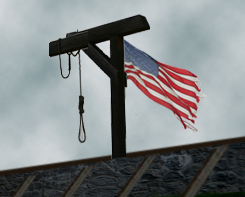Tag: Patriot Act (page 2)

Scarecrow at Firedoglake and Marcy at The Next Hurrah are covering today's New York Times article suggesting that the FISA Amendment grants far more power than previously thought to intercept phone calls and obtain call and e-mail records of ordinary Americans not suspected of being involved in terrorism.
Broad new surveillance powers approved by Congress this month could allow the Bush administration to conduct spy operations that go well beyond wiretapping to include — without court approval — certain types of physical searches on American soil and the collection of Americans’ business records, Democratic Congressional officials and other experts said.
I'd like to focus on one other aspect: deficiencies in reporting requirements. How will the American whose conversations, business records, call records or e-mails are intercepted by virtue of the FISA Amendment find out and how will they be able to challenge it? The answer, as far as I can tell, is they won't know about it and they won't be able to make a legal challenge. The ACLU describes the paltry reporting requirements here.
More...
(2 comments, 901 words in story) There's More :: Permalink :: Comments


While we're on the topic of the Patriot Act today, the L.A. Times reports that the Justice Department may begin using one of its rarely noted provisions -- one that gives the Attorney General the power to shorten the time period within which state death row inmates can file federal appeals of their death sentences. New regulations have been proposed to implement the power.
The rules implement a little-noticed provision in last year's reauthorization of the Patriot Act that gives the attorney general the power to decide whether individual states are providing adequate counsel for defendants in death penalty cases. The authority has been held by federal judges.
Under the rules now being prepared, if a state requested it and Gonzales agreed, prosecutors could use "fast track" procedures that could shave years off the time that a death row inmate has to appeal to the federal courts after conviction in a state court.
As for what the new regulations provide:
The procedures would cut to six months, nstead of a year, the time that death row inmates have to file federal appeals once their cases have been resolved in the state courts.
It would also impose strict guidelines on federal judges for deciding such inmates' petitions. Federal district judges would have 450 days, appeals courts 120 days.
If it weren't so serious, this line would make me laugh: "Proponents say that would prevent foot-dragging by liberal judges."
As if that's the problem given the number of wrongfully convicted people on death row, those denied adequate counsel and DNA testing at the state level, and a host of other constitutional guarantees.
It was bad enough that AEDPA limited habeas appeals to one year. This is even worse.
Update: The ACS blog has more.
(7 comments) Permalink :: Comments
Via Instapundit, a case of the federal government using "sneak and peek" search warrants in a Tennessee cockfighting case with no connection to terrorism.
The Patriot Act expanded the government's ability to use sneak and peek (delayed notice) warrants.
“This is one of the few provisions of the Patriot Act that was sneaked into the Patriot Act in the middle of the night so that no one knew it was there,” said Michelle Richardson, a legislative consultant for the ACLU’s Washington, D.C., Legislative Office. “It was passed without everyone knowing about it.”
Prior to the Patriot Act, she said, federal courts had held that agents could conduct secret searches and defer notifying the targets for short periods of time in very limited circumstances, such as when someone’s life might be in danger.
More....
(3 comments, 311 words in story) There's More :: Permalink :: Comments
The Senate has Senate voted to repeal the secret Midnight Patriot Act provision that granted AG power to appoint interim US Atty's without Senate confirmation:
The Senate voted overwhelmingly Tuesday to end the Bush administration's ability to unilaterally fill U.S. attorney vacancies as a backlash to Attorney General Alberto Gonzales' firing of eight federal prosecutors.. . . With a 94-2 vote, the Senate passed a bill that canceled a Justice Department-authored provision in the Patriot Act that had allowed the attorney general to appoint U.S. attorneys without Senate confirmation.
. . . Essentially, the Senate returned the law regarding the appointments of U.S. attorneys to where it was before Congress passed the Patriot Act, including the unilateral appointment authority the administration had sought in the wake of the 9/11 terror attacks.
More on the bill from Jeralyn.
(4 comments) Permalink :: Comments
| << Previous 12 |







